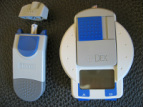By Robert Aden, MD
When left untreated, thyroid disorders can have a profound impact on a person's health and life. The thyroid gland is much like a traffic controller, guiding nearly all of the body’s metabolic processes. When the thyroid gland overproduces thyroid hormone, the result is hyperthyroidism; hypothyroidism is the condition that results from too little thyroid hormone production.
The thyroid is small butterfly-shaped gland located in the neck just below the Adam’s apple, and above the voice box. The gland can sometimes enlarge, causing a goiter. Medications that treat thyroid disorder can keep the gland from enlarging to the point at which it must be removed; in some cases, they can actually cause the gland to shrink.
Your physician will diagnose thyroid disorder through blood tests and symptoms. Sometimes an ultrasound of the neck is ordered, and if nodules are found, a fine needle aspiration biopsy may be performed. Although the cause of thyroid disorder may be transient, as in the case of postpartum thyroiditis, the majority of people who suffer from thyroid disease will be on medication for their entire lives.
About the Author: Robert Aden, MD, is board certified in endocrinology and internal medicine, and he has received procedural certification in Thyroid Ultrasound and Ultrasound Guided Fine Needle Aspiration. Dr. Aden treats patients in and around Miami, Florida.
When left untreated, thyroid disorders can have a profound impact on a person's health and life. The thyroid gland is much like a traffic controller, guiding nearly all of the body’s metabolic processes. When the thyroid gland overproduces thyroid hormone, the result is hyperthyroidism; hypothyroidism is the condition that results from too little thyroid hormone production.
The thyroid is small butterfly-shaped gland located in the neck just below the Adam’s apple, and above the voice box. The gland can sometimes enlarge, causing a goiter. Medications that treat thyroid disorder can keep the gland from enlarging to the point at which it must be removed; in some cases, they can actually cause the gland to shrink.
Your physician will diagnose thyroid disorder through blood tests and symptoms. Sometimes an ultrasound of the neck is ordered, and if nodules are found, a fine needle aspiration biopsy may be performed. Although the cause of thyroid disorder may be transient, as in the case of postpartum thyroiditis, the majority of people who suffer from thyroid disease will be on medication for their entire lives.
About the Author: Robert Aden, MD, is board certified in endocrinology and internal medicine, and he has received procedural certification in Thyroid Ultrasound and Ultrasound Guided Fine Needle Aspiration. Dr. Aden treats patients in and around Miami, Florida.

 RSS Feed
RSS Feed